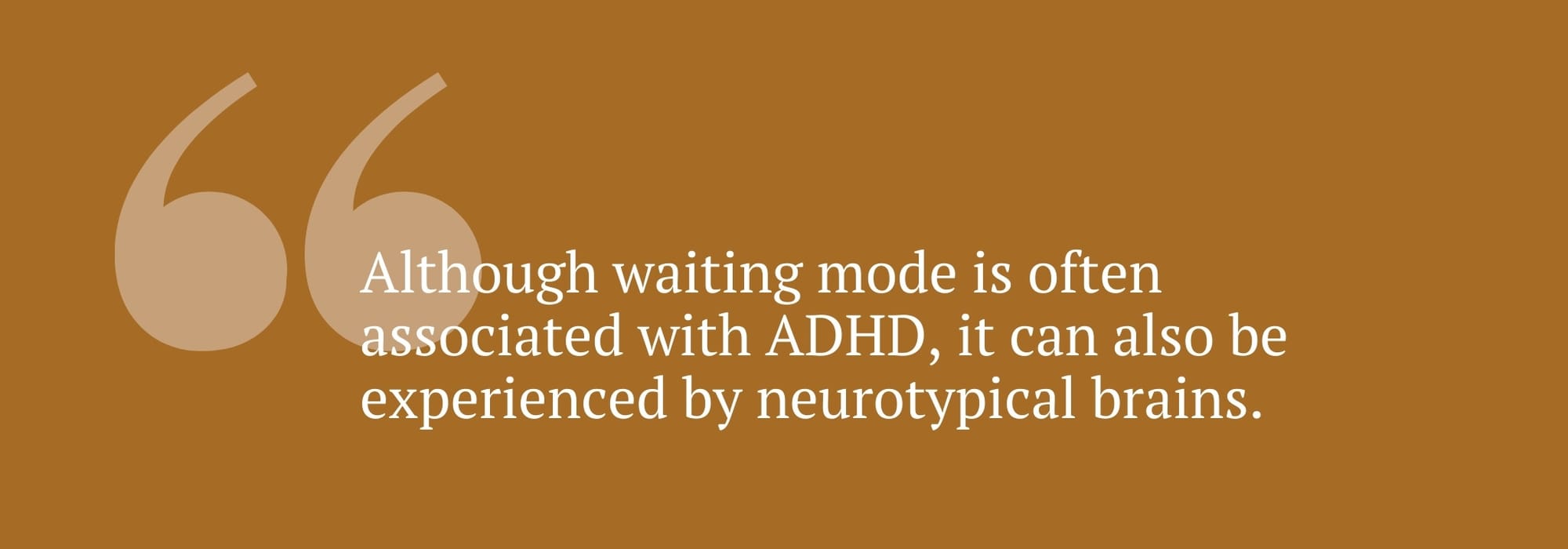Do you ever feel ‘stuck’, anticipation rising, because you have plans later in the day that seem to dictate all your time in the build up? You might be in ‘waiting mode’...
Imagine this: you’ve been waiting all month for a lunch date with your bestie, and the day has finally arrived. It’s Saturday morning, after what’s felt like a very long, busy week. But it’s early morning now, and your reservation isn’t until 1.30pm. You know there’s no reason to avoid doing other things in the meantime – perhaps going for a walk or diving into a book – but you’re too anxious to do anything other than simply wait for time to pass. You don’t want to end up miscalculating and being late. You’re frozen; you’re in waiting mode.
What is waiting mode?
Commonly discussed in relation to those with attention deficit hyperactivity disorder (ADHD), ‘waiting mode’ is a state where someone feels unable to start or complete tasks when they have an upcoming appointment, or event later that day. “It’s like our minds get stuck, frequently focusing on the future event, impacting our ability to focus on present tasks,” explains therapist and coach Natalie Englander.
What are the causes?
There are several reasons why neurodivergent people may experience this phenomenon. For example, ADHDers have limited working memory, which means you might worry that you’ll forget about the upcoming appointment, leading you to fixate on the event to ensure you don’t overlook it. Hyperfocus plays a similar role; maybe in the past, you’ve missed appointments because you were so deeply focused on something else that you lost track of time. To cope, you don’t allow yourself to do anything, just in case it swallows up your attention.
Another contributing factor is ‘time blindness’ – the inability to recognise when time has passed, or to estimate how long something will take – which can lead to long, unproductive stretches because you’re unable to manage or make use of the time leading up to the appointment. To top it all off, you may also find yourself in waiting mode as a result of decision paralysis – the overwhelm that comes from figuring out how to use your time, which, when combined with the factors outlined already, may feel close to impossible.

Although waiting mode is often associated with ADHD, it can also be experienced by neurotypical brains. According to Natalie, this can be the result of unhelpful thinking styles: “We might be making negative ‘predictions’ about how the appointment is going to go, or we might be ‘catastrophising’ that something will go wrong at the event, or we might make assumptions and find ourselves ‘mind-reading’ with thoughts that people won’t like us, or we might ‘compare and despair’ believing that everyone else handles these events much better than us.
“When we think negatively about things, the event or appointment is more likely to be perceived as a threat, and when there’s a potential threat (real or imagined) it’s much harder to focus on other things like getting tasks done.”
Anxiety is another potential cause. “Our fight-or-flight response might kick in, and it’s important to remember our emotional and physical responses aren’t always just to fight or flight, we can also experience a ‘freeze’ response, too, which might contribute to a sense of stuckness and being unable to do anything else,” explains Natalie.
An inability to regulate emotions can contribute as well. Natalie says: “We might feel less able to tolerate the anticipation of an upcoming appointment or event if it’s anxiety-inducing, or we might struggle to tolerate the feelings of impatience, making it harder to focus on other things and engage in more productive activities.”
While waiting mode isn’t a clinical term, it’s a widely recognised concept that has a genuine impact on those who experience it. So, what can we do about it?
Focus on the present
Honing your ability to focus can give you a sense of control when you’re in waiting mode. Natalie suggests mindfulness as a strategy to build up this skill. “It’s helpful to remember there are different ways to practise mindfulness – it doesn’t just have to involve sitting for long periods of time listening to a meditation recording!” Natalie says. “You can practise mindfulness while walking around, focusing on what you can see and hear around you for example, or you can do it by spending just one minute focusing on your breathing, before continuing on with your day as normal.”

Ground yourself
When you feel stuck in waiting mode, and anxiety seems like the cause, Natalie recommends getting grounded to halt overthinking. “Try the 5-4-3-2-1 grounding technique – notice five things you see, four things you hear, three things you can feel, two things you smell, and one thing you can taste.” This refocuses your attention on the present moment, away from the worry of what’s to come.
Timeblocking
If time blindness makes waiting mode particularly common for you, try designating specific blocks of time for doing particular tasks. For example, in the time before your appointment you could allow yourself 90 minutes to fully sink into a TV show. Alternatively, map out your entire morning in timeblocks. “For example, one hour for emails, 30 minutes for exercise, and so on, and see if it helps writing it down and creating yourself a plan to follow,” suggests Natalie. “This helps you to be productive and stay on track, as well as creating psychological permission for you to fully engage in the present tasks.”
Gamify tasks
Instead of seeing waiting mode as a period of time you have to wade through, reframe it as a game by using timers and rewards. “If you know you’ve got an hour until you need to leave for your appointment, give yourself a target of what task you want to do, set a timer, and make it fun,” says Natalie. Of course, what makes a task fun is unique to you – perhaps you play loud music as you clean, mark off a habit tracker after you exercise, or try to beat the clock by pairing odd socks as quickly as you can, followed by your favourite snack as a reward for completing it.
Waiting mode can feel frustrating, but with the right tools and strategies, you can take back control and ease the anxiety of anticipation. By grounding yourself in the present, and reframing the waiting period as an opportunity rather than an obstacle, you can turn those in-between moments into something meaningful.


Comments